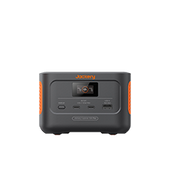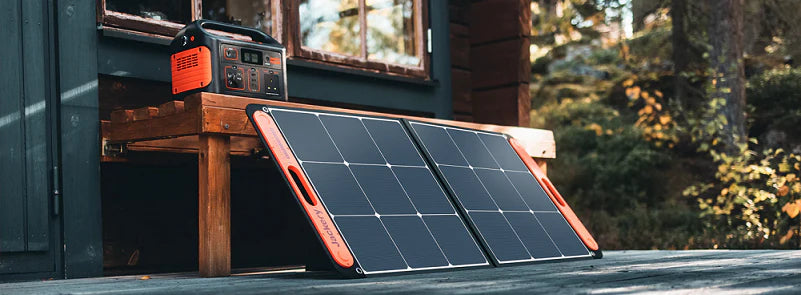Having a backup generator can provide peace of mind by ensuring you have power during an outage. However, traditional gas-powered generators can generate a lot of noise that may disturb your neighbours. This is why you need to look for a quiet electric generator.
If you're considering installing a generator in your backyard, it's important to weigh options for quieter models. It will help you maintain backyard and neighbourhood harmony. In this article, we will share more details to help you buy that perfect small electric generator for your needs.
Quiet Electric Generator Vs. Silent Diesel Generator: How Does Noise Come?
When evaluating generator options for backyard use, one of the most important considerations is the noise output and sources. Understanding where the sound comes from and potential volumes can help determine suitability based on your context. Below is a comparison of common sources of noise and decibel ranges for both diesel and solar generators:
Diesel Generators
- Noise Level Range: 95-125 decibels
-
Major Noise Sources:
- The combustion process of the diesel engine itself
- Mechanical moving parts like fans, alternators, and engine body vibrations
- Exhaust noise as byproducts are expelled
- General wear and tear lead to loose parts and more noise over time
- The motor of a diesel generator has multiple components that must ignite fuel and spin at high RPMs. This creates noticeable noise emissions. And over time, with more use, the increased vibrations from wear can cause even louder noise, sometimes up to 105 decibels from 30 feet away.
Solar Generators
- Noise Level Range: Extremely low to none
-
Major Noise Sources:
- Minor humming from the power inverter converting solar-captured DC electricity to AC
- No engine, exhaust, or mechanical components involved in the conversion and supply of electricity
- With a silent operating solar panel system capturing the sun's energy and a power station for storage, solar generators can offer virtually silent operation. The only sound emitted would be a low hum from the inverter when drawing electricity for use with appliances plugged in which is unlikely to be noticed from even a few feet away. This makes them ideal for close neighbourhood living spaces.
The dramatic differences in sound levels and sources should be strongly considered when choosing between diesel and solar for your needs. While diesel offers high power output, the noise tradeoffs may not be suitable for tight backyard spaces where solar can provide quiet, renewable energy.
Attempting to Reduce Diesel Generator Noise
While diesel generators can provide high levels of backup power, their significant noise remains a reality. However, there are some techniques that can dampen and direct sound emissions away from neighbours in a backyard setting. It's unlikely that a hobbyist-level diesel generator will ever be completely silent, but the following methods can help reduce noise disturbances:
1. Installing Exhaust System Mufflers
Most portable diesel generators contain integrated exhaust mufflers. However, you can choose models featuring larger, high-density mufflers. Or you can have an exhaust shop professionally outfit extra-strength external mufflers onto the generator. It routes the expelled byproducts through sound-dampening materials. This redirects some of the noise into the muffler compartment rather than blasting straight into the open environment.
Potential Side Effects
Larger muffler systems add more back pressure, requiring the generator engine to work harder. This can lead to decreased fuel efficiency, more emissions, and faster engine wear over extended outages.
2. Noise Enclosures and Barriers
Specially designed enclosures made of dense materials like reinforced steel or sound-dampening mesh wrap around the generator, acting as a buffer. The enclosure contains some of the vibration, engine operation noise, and exhaust noise before it disperses into the air. Strategic placement behind sound barriers like walls or fences adds another layer of protection, redirecting emissions away from neighbours.
Potential Side Effects
Enclosures can lead to increased operating temperatures, which accelerates system wear. They also add cost for the box materials and space needed to house the enclosure in the yard. Barriers mainly redirect rather than eliminate noise, which could impact other neighbours.
3. Vibration Dampening Mounts
Installing the generator with shock-absorbing rubber mounts helps minimize contact vibrations with the ground that amplify operational noise. This suspends the unit and allows some noises to be absorbed rather than amplified outwards through hard material contact. High-density pads under the generator also dampen vibrations, decreasing noise translation.
Potential Side Effects
The best vibration-dampening materials tend to be more expensive. Rubber mounts also need to be precisely calibrated so as not to overly isolate the generator, causing operational problems if the unit rocks excessively on its mounts.
4. Regular Maintenance
Keeping the mechanical diesel systems properly maintained prevents abnormal loose parts, oil leakage, and filthy components, which all could increase noise above normal operating levels for that model generator over time. Well-tuned and lubricated systems run more quietly and efficiently.
Potential Side Effects
While regular costs for technicians to service and tune the diesel generator help limit noise increases from dysfunctional operation, it does not eliminate the baseline mechanical noise emitted even from models in good working order.
5. Observing Community Hours
Local noise ordinances often restrict higher decibel equipment usage to weekday daylight hours or weekends. Refraining from running loud diesel generators at night very early/late demonstrates consideration for others' rest and quality of life - especially for bedrooms positioned near the source location wall.
Potential Side Effects
Usage limited to specific permitted hours means backup power would remain unavailable for your home overnight during an outage. A quiet electric generator, by comparison, could continue quietly sustaining critical loads all night.
While each technique above offers some sound reduction for diesel generators, implementing them all likely will not reduce noise to levels compatible with tight residential spaces. This is why you should think about getting a quiet electric generator. In the next section, we will share some of the best small electric generator options available out there to consider.

Upgrading to Affordable Silent Solar Power
After covering techniques like sound enclosures and taller fences to marginally reduce diesel generator noise, implementing these solutions still leaves significant sound emissions. Short of excavating an underground bunker that fully contains the blast radius, diesel engines realistically will never be silent.
The costs of industrial mitigation efforts often rival the generator purchase itself. This leaves upgrading your backup power system to an inherently quiet solar generator as the most affordable and effective permanent noise solution.
A small electric generator uses silent renewable energy from the sun rather than combustible fuels. By removing the mechanical engine and directly storing electricity in integrated batteries, they generate no operational noise when used. Leading brand Jackery offers user-friendly solar generators built for home backyard needs rather than noisy diesel models designed for large-scale construction sites. Their affordable Explorer models provide essential backup capability without noise or emissions. Let’s take a look at a few options available under the Jackery brand for anyone seeking a quiet electric generator.
Jackery Solar Generator 2000 Plus
- Powerful 3000-watt output from lithium battery storage quietly sustains fridges, lamps, internet modems, and more overnight.
- Fast solar recharging in hours(with 6 Jackery SolarSaga 200W solar panels) lets you repetitively capture the sun’s silent energy for 10+ years of reliable use.
- Advanced BMS battery management and cell balancing safely optimize each charge cycle.
- Rolling suitcase design neatly fits in small yards without noise enclosures needed.
Jackery Solar Generator 300 Plus
- Perfect personal-sized small electric generator for powering backyard garden lights all night silently.
Safe battery technology prevents overheating for clean, renewable power anywhere outdoors.
- Support neighbourhood harmony as the smallest and most affordable Jackery model at under 1 cubic foot in size.
As you can see, upgrading to a Jackery small electric generator is the best option available to overcome noise issues in a traditional generator. You don’t need to go through a complex installation process after getting a quiet electric generator as well. All you have to do is to plug it and play, without any wiring work.
It is true that a silent diesel generator can be muted. However, a quiet electric generator from Jackery doesn’t require any muffing at all. Such a small power generator is more silent than a super quiet generator powered by diesel. Therefore, people who live in your house will never be disturbed by the noise as well. You will fall in love with the quiet electric generator and the benefits it can offer.

Frequently Asked Questions
When exploring generators for backyard use, some common questions arise around models with lower noise outputs. Here we address a few of these FAQs:
Are there quiet diesel generators?
There are "quieter" diesel generators on the market, but reaching extreme noise reductions remains challenging. Some industrial models boast specialized enclosures and exhaust systems claiming decibel levels under 80 dB.
However, open-frame portable diesel generators in affordable backyard sizes often still produce 95-120dB in operation - equivalent to a roaring jet taking off. While marginal sound dampening helps, expecting a fuel-burning engine to run truly silent places limitations. This is why you should go for a small electric generator.
Would a small electric generator be quieter?
Yes, a small electric generator will obviously be a quiet option available. They don’t have a mechanical engine as you would see in a gas or diesel powered generator. Instead, a quiet electric generator will use solar panels to generate electricity. Hence, there are no moving components. This mechanism makes a small electric generator super-silent.
What are the benefits of a quiet electric generator?
A small electric generator with under 60dB running volume offers multiple advantages:
- Sustain power overnight without disturbing the sleep of you or your neighbours
- Blend into background ambient noise to avoid disruption
- Qualify for noise ordinances that restrict loud generators
- Prevent conflicts stemming from loud generator operation
- Safely run indoors to power appliances if fumes are contained
The gold standard for quiet, affordable, capable backyard power lies with solar generators. Their silent, renewable operation from solar panels and integrated batteries produces no emissions or engine noise. Leading Jackery Explorer models can seamlessly sustain essential loads overnight with zero noise or disturbances. Even directly next to the unit, faint humming from the inverter barely registers above a whisper. For blackout resilience without noise consequences, solar generators lead the category. Hence, anyone looking for a small electric generator with silent operation can stick to Jackery products.
Final Words
When choosing a backup generator for backyard use, you need to pay special attention to the noise levels. Traditional diesel generators are notoriously loud - creating discord even when attempting sound reduction methods. Upgrading to a quiet electric generator like Jackery's affordable models proves the superior solution.
By storing power in integrated batteries directly from solar panels, Jackery's small electric generator options operate free of toxic emissions or sound. Such a quiet electric generator enhances community harmony in shared spaces. Moreover, their quiet capability reliably sustains essential loads overnight off-grid.





































































































